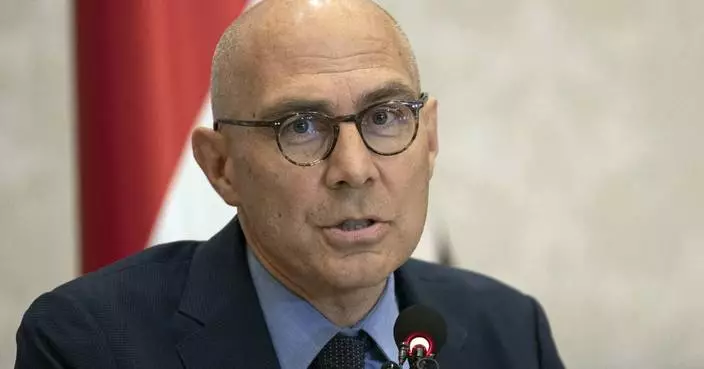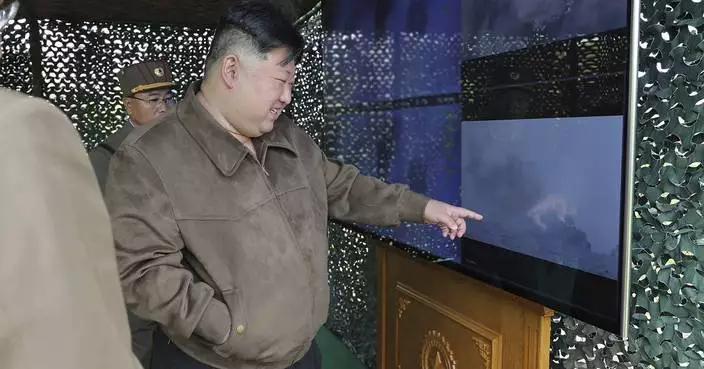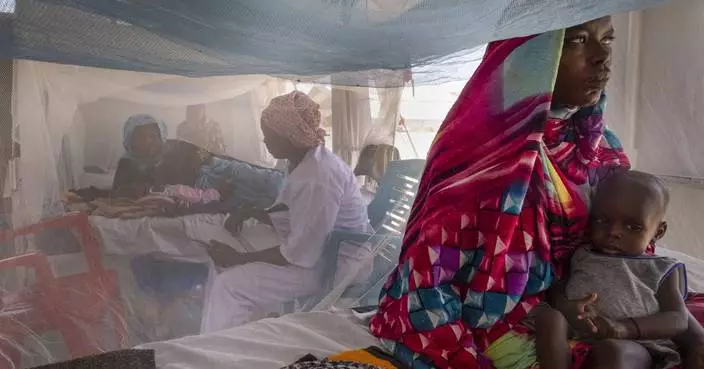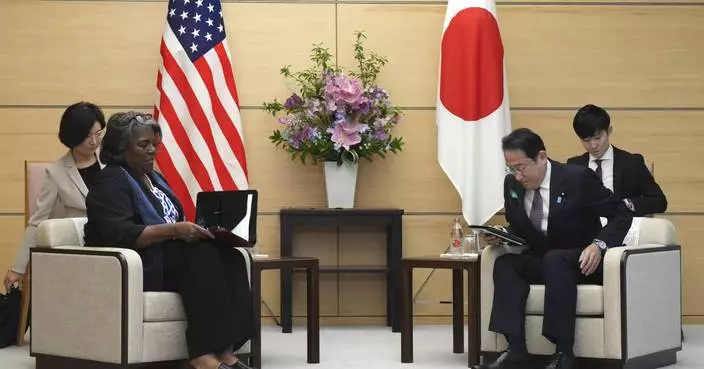The Nobel Peace Prize-winning surgeon whose hospital in war-torn Congo has treated over 50,000 victims of sexual violence has launched a fund with the goal of providing reparations for survivors of conflicts around the world.
Dr. Denis Mukwege said in an interview Saturday that he and his team at Panzi Hospital in eastern Bukavu province could physically and mentally help victims of rape and other abuse, but that the only way to really heal survivors is for society to accept the wrong that was done to them through reparations.
Legal action can be taken against an alleged perpetrator, he said, but even in cases in which women win, "there is no reparation."
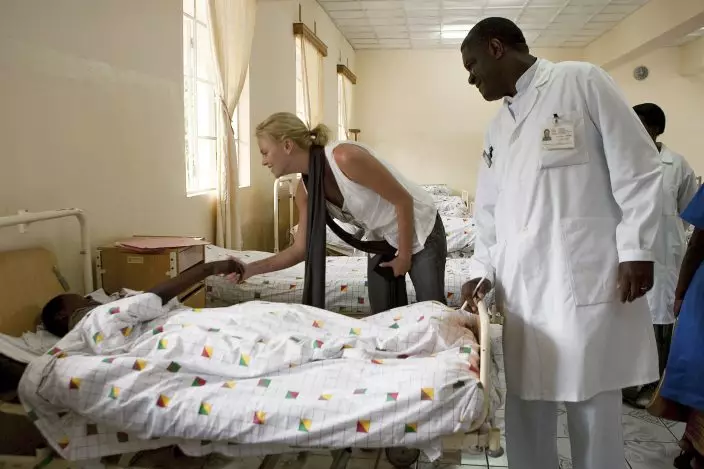
In this March 30, 2009, photo provided by the United Nations, Dr. Denis Mukwege, right, director of Panzi Hospital, stands by actress and U.N. Ambassador for Peace, Charlize Theron, as she visits the hospital in Bukavu, South Kivu, Congo. Mukwege, the Nobel Peace-prize winning surgeon whose hospital in war-torn Congo has treated over 50,000 victims of sexual violence, has launched a fund with the goal of providing reparations for survivors of conflicts around the world. (Marie FrechonThe United Nations via AP)
Mukwege said reparations can be individual or collective, symbolic or financial, depending on the victim, the case and the context.
"In some cases, women are just asking us to ask the leaders to ... say, 'I apologize for what just happened to you because I was maybe the leader in this place and I didn't protect you,'" Mukwege said. "Then maybe for the women, this can be enough."
But in other cases, women might want financial reparations to support them, to pay for school, or to return to previous activities or start new ones, he said, "so this fund really works in different ways, depending with the conflicts."
"For 10 years I was fighting to get a global fund," Mukwege said, "because ... what is happening in Congo is happening everywhere where we have conflict."
The fund is trying to get governments and the private sector to give money, he said, but its board will also include victims of sexual violence and civil society representatives.
France is the first country to commit to the fund, pledging $2 million a year for three years in an important show of support, Mukwege said.
Mukwege is in New York on a tour organized by Doctors of the World, a longtime funder of the Panzi Hospital. It will also take him to California and Washington state to talk to foundations about the fund.
Mukwege is also planning to meet several world leaders and attend events on the sidelines of the upcoming annual gathering of presidents, prime ministers and monarchs at the U.N. General Assembly.
Female victims around the world face similar challenges, Mukwege said, and he has recently seen how sexual violence survivors from the Bosnian war have overcome their problems, "and how they can help Congolese women to help face this big problem."
He also traveled to South Korea to see the "comfort women" used as sex slaves by Japanese soldiers in World War II and visited Colombia and victims of that country's long civil war. He plans to start programs for victims of sexual violence in the Central African Republic and Burundi, he said.
Mukwege shared the 2018 Nobel Peace Prize with Nadia Murad, a Yazidi woman who was raped by Islamic State militants in Iraq and has become a global advocate for victims of sexual violence.
"She and I are working together," he said. "I was in Iraq to see exactly what was happening there, and I hope that this year, I will start to support Yazidi women."
The program will operate in different camps where the Yazidis are, not in the Sinjar region where Islamic State extremists stormed Yazidi communities in 2014, Mukwege said.
Having spent much of his life treating female victims of sexual violence, Mukwege said, "today my policy is to work more with men because I think that it is very important in talking about a positive masculinity."
"We are really in a patriarchal system where men dominate everything and women are treated just as objects," he said. "We need to change our way to treat women and see women in our society and ... let young boys grow up to respect women and understand that women are equal to men — and this has to start very early."
WASHINGTON (AP) — Lawyers for an American believed to be held by the Taliban for nearly two years are asking a United Nations human rights investigator to intervene, citing what they say is cruel and inhumane treatment.
Ryan Corbett was abducted Aug. 10, 2022, after returning to Afghanistan, where he and his family had been living at the time of the collapse of the U.S.-based government there a year earlier. He arrived on a valid 12-month visa to pay and train staff as part of a business venture he led aimed at promoting Afghanistan's private sector through consulting services and lending.
Corbett has since been shuttled between multiple prisons, though his lawyers say he has not been seen since last December by anyone other than the people with whom he was detained.
In a petition sent Thursday, lawyers for Corbett say that he's been threatened with physical violence and torture and has been malnourished and deprived of medical care. He's been held in solitary confinement, including in a basement cell with almost no sunlight and exercise, and his physical and mental health have significantly deteriorated, the lawyers say.
Corbett has been able to speak with his family by phone five times since his arrest, including last month. His family has not been able to see him — his only visits have been two check-ins from a third-party government — and their characterizations of his mistreatment are based on accounts from recently released prisoners who were with him and his openly dispirited tone in conversations.
“During Mr. Corbett’s most recent call with his wife and children, Mr. Corbett indicated that the mental torture and anguish have caused him to lose all hope,” said the petition, signed by the Corbett family attorneys, Ryan Fayhee and Kate Gibson.
The petition is addressed to Alice Edwards, an independent human rights investigator and the special rapporteur for torture in the Office of the High Commissioner for Human Rights at the U.N. It asks Edwards, who was appointed by the U.N. Human Rights Council, to “urgently reach out to the Taliban to secure Mr. Corbett’s immediate release and freedom from torture, as guaranteed by international law.”
"This situation is just dragging on, and I’m increasingly concerned and taking steps that I hope will make a difference and help the situation — just increasingly concerned and panicking about Ryan’s deteriorating health and physical and mental health," Corbett's wife, Anna, said in an interview. “And that was leading me to take this next step.”
The U.S. government is separately working to get Corbett home and has designated him as wrongfully detained. A State Department spokesman told reporters last month that officials had continually pressed for Corbett's release and were “using every lever we can to try to bring Ryan and these other wrongfully detained Americans home from Afghanistan."
A spokesperson for the Interior Ministry in Afghanistan said this week that it had no knowledge of Corbett's case.
Corbett, of Dansville, New York, first visited Afghanistan in 2006 and relocated there with his family in 2010, supervising several non-governmental organizations.
The family was forced to leave Afghanistan in August 2021 when the Taliban captured Kabul, but he returned the following January so that he could renew his business visa. Given the instability on the ground, the family discussed the trip and “we were all pretty nervous,” Corbett's wife said.
But after that first uneventful trip, he returned to the country in August 2022 to train and pay his staff and resume a business venture that involved consulting services, microfinance lending and evaluating international development projects.
While on a trip to the northern Jawzjan province, Corbett and a Western colleague were confronted by armed members of the Taliban and were taken first to a police station and later to an underground prison.
Anna Corbett said that when she learned her husband had been taken to a police station, she got “really scared” but that he was optimistic the situation would be quickly resolved.
That, however, did not happen, and Anna Corbett, who has three teenage children and makes regular trips to Washington, said she's trying to advocate as forcefully as she can while not letting “anxiety take over.”
“I feel like it’s the uncertainty of all of it that just is so difficult because you just don’t know what’s going to come at you — what call, what news," she said. "And I’m worried about Ryan and the effect of the trauma on him and then also on my kids, just what they’re experiencing. I've tried to protect them the best I could, but this is so difficult.”
Associated Press writer Riazat Butt in Kabul, Afghanistan, contributed to this report.
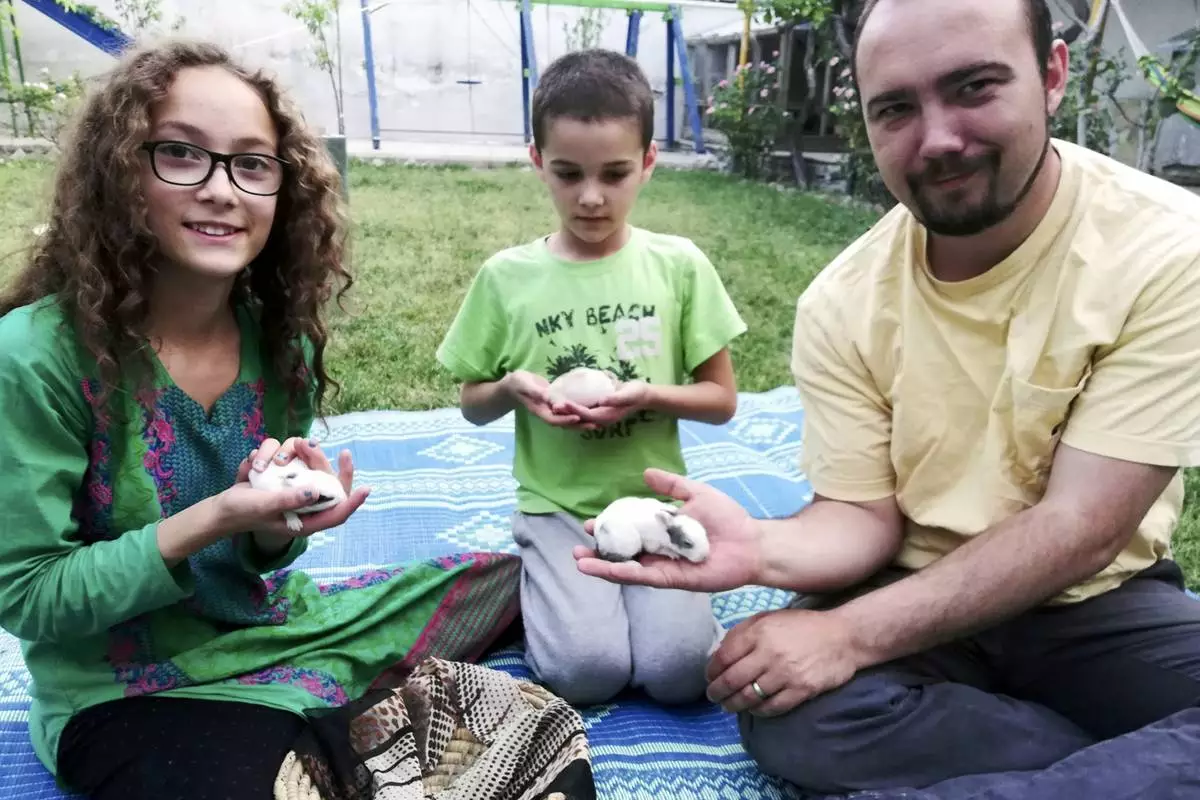
This family photo shows Ryan Corbett holding rabbits with his daughter Miriam and son Caleb in Kabul, Afghanistan in 2020. Lawyers for Corbett, believed held by the Taliban for nearly two years, are asking a United Nations human rights investigator to intervene, citing what they say is cruel and inhumane treatment. Corbett was abducted on August 10, 2022 after returning to Afghanistan, where he and his family had been living at the time of the collapse of the U.S.-based government there one year earlier, on a valid 12-month business visa to pay and train staff. (AP Photo/Anna Corbett)






